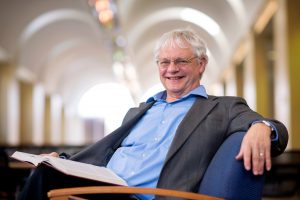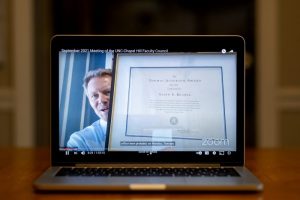This year’s Jefferson Award winner emphasized Jefferson’s ideals of expanding knowledge, fostering diverse ideas and defending democracy, rather than his contradictions and his racist flaws.

History is always complicated, Lloyd Kramer said.
In this case, Kramer, a history professor and director of Carolina Public Humanities, is talking about Thomas Jefferson, a controversial figure given his contradictions, the most glaring being his view of human rights in the Declaration of Independence, which he directly contradicted through his ownership of enslaved people.
“He is the most controversial of all the founding fathers,” Kramer said. “We’ve learned a great deal about his personal life and about his relationship with Sally Hemings. We’ve learned about the enslaved people who worked at Monticello. And Jefferson’s racism and his actions that denied enslaved people the basic rights that he famously proclaimed in the Declaration of Independence have made him a very problematic figure.”
Kramer, a well-known scholar, a beloved award-winning teacher and an active volunteer on numerous committees, shared these thoughts in his acceptance speech when he received the Thomas Jefferson Award, one of the University’s highest honors for faculty, during September’s Faculty Council meeting.
Kramer explained that he was accepting the award by emphasizing Jefferson’s ideals of expanding knowledge, fostering diverse ideas and defending democracy, rather than his contradictions and his racist flaws.
Kramer read the inscription on Jefferson’s tombstone: “Here was buried Thomas Jefferson, author of the Declaration of Independence of the Statute of Virginia for Religious Freedom and father of the University of Virginia,” adding that these three ideals are central to Jefferson’s intellectual legacy.
The tombstone also refers to the mission of a great university, Kramer said. “We have the task of promoting the best possible education, promoting the freest possible expression of ideas, knowledge and ethical commitments, and promoting the human rights and institutions that build a foundation for democratic societies,” he said. “In other words, our work is linked to Jefferson’s ideal goals of expanding knowledge, tolerating diverse ideas and creating a free, democratic society.”
Despite Jefferson’s racist flaws, Kramer said, “We have to think with Jefferson’s other ideas while we also think against his racism. I believe that the acceptance of the Jefferson Award also requires an acceptance of the ambiguity and complexity that are at the center of both history and a liberal arts education.”
The Thomas Jefferson Award was established in 1961 by the Robert Earll McConnell Foundation. It is presented annually to “that member of the academic community who through personal influence and performance of duty in teaching, writing and scholarship has best exemplified the ideals and objectives of Thomas Jefferson,” whose complex legacy includes the values of democracy, public service and the pursuit of knowledge.
Chancellor Kevin M. Guskiewicz presented the award during the virtual meeting. “[Lloyd] has served our University’s mission of service, teaching and research faithfully. He’s a fantastic orator, an amazing teacher and I have valued his wisdom, insight and commitment to higher education.”

“Lloyd has compiled an extraordinary record of achievement as a scholar and University citizen in ways that exemplified the ideals of Thomas Jefferson in promoting democracy, public service and the pursuit of knowledge,” said Vin Steponaitis, William E. Leuchtenburg Distinguished Professor of Archaeology and Anthropology, who introduced Kramer.
Steponaitis is a former secretary of the faculty. In 2019, the Faculty Governance’s Advisory Committee asked Kramer to serve as chair of the faculty for 14 months when Leslie Parise was not able to complete her term.
A distinguished scholar, Kramer has written or edited nine books and numerous scholarly articles about modern European history, Steponaitis said. He is well-known for his award-winning book “Lafayette in Two Worlds,” which provides an influential reinterpretation of the American Revolutionary War general from France who became a lifelong friend of Thomas Jefferson.
“Given Lloyd’s enviable record of scholarship, service, public engagement and teaching, one would be hard-pressed to find anyone on our faculty more deserving of this award,” Steponaitis said.
Kramer came to Carolina in 1986 as an assistant professor. He has served as an associate director and acting director of the Institute for the Arts and Humanities and has been a transformative leader of Carolina Public Humanities, one of the University’s main public outreach units connecting the broader community with Carolina’s scholars.
Following Kramer’s acceptance, Faculty Chair Mimi Chapman said, “This year’s winner is the perfect person to think through the legacy of this award.”
After the presentation of the award in 2020, Chapman said people began to call her about changing the award because of its association with a slave owner. Two options are to either change the award description or discontinue the award. Several faculty members said they would no longer nominate people for the award in its current state or accept the award if it were given to them. Because the award is one of a few that faculty give to faculty, she asked Pat Parker and Jim Leloudis, co-chairs of the University Commission on History, Race and a Way Forward, to make a recommendation about the award’s future.
Modifications were made this year to the award description, to articulate Jefferson’s “complex legacy, including the values of democracy, public service and the pursuit of knowledge.”
The award’s original donor has passed away and has no descendants, so it’s not possible for the University to go back to the donor to consider changing the award. A bank now manages the fund for the award.
A recording of the September Faculty Council meeting is available.
By Jane Calloway, The Well
